The new British Defense Secretary visits Ukraine, the Chinese Ambassador calls on the US to take early action... are some notable international news in the past 24 hours.
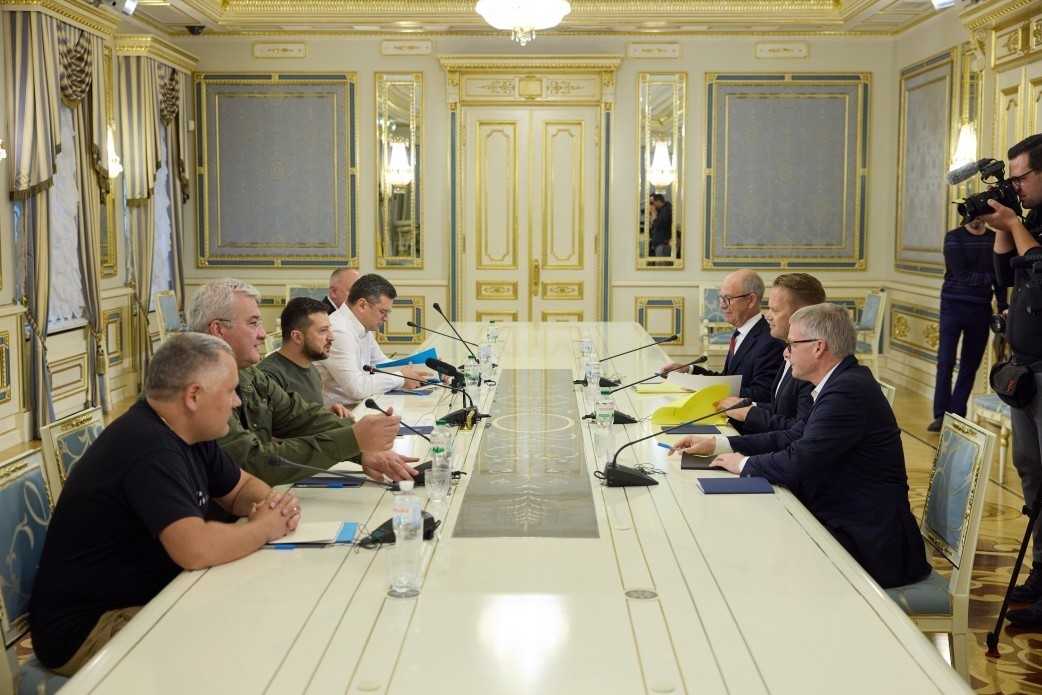 |
| Ukrainian President Volodymyr Zelensky holds talks with British Defense Secretary Grant Shapps on September 28 in Kiev. (Source: Office of the President of Ukraine) |
The World & Vietnam Newspaper highlights some of the day's international news highlights.
* Russia is ready to implement agreements on Ukraine on this condition : September 28: In an interview with TASS (Russia), Foreign Minister Sergei Lavrov emphasized: “Our position remains the same: We are ready to agree on agreements, provided that the current situation on the ground is taken into account. This is a position that everyone is well aware of and our security interests, including the need to prevent the creation of a hostile regime near the Russian border, which openly declares its goal of eliminating everything Russian in Crimea and Novorossiya - places that the Russians have discovered and developed for centuries. ” Previously, he affirmed that the longer negotiations with Moscow are delayed, the more difficult it will be for Kiev to reach an agreement. According to him, Ukrainian President Volodymyr Zelensky's ban on negotiations with Russia needs to be lifted to pave the way for dialogue.
In addition, the Russian Foreign Minister accused Western countries of undermining Ukraine's territorial integrity by admitting that they have no plans to implement the Minsk Peace Agreements. He pointed out: "When the developers of the Minsk Agreements admit that they actually deceived (President) Putin because they have no plans to implement this agreement, they have undermined Ukraine's territorial integrity."
He stressed that last year, former German Chancellor Angela Merkel, former French President Francois Hollande and former Ukrainian President Pyotr Poroshenko affirmed that the only goal of the Minsk Agreements “is to buy time to replenish Ukraine’s weapons against Russia… If they implement the Agreements, they will ensure the territorial integrity of Ukraine because this is what the agreement says: the territorial integrity should be restored after Donbass, including the self-proclaimed Lugansk People’s Republic (LPR) and Donetsk People’s Republic (DPR), receives special status.” (TASS)
* New British Defense Secretary visits Ukraine : On September 28, Mr. Grant Shapps met with Ukrainian President Volodymyr Zelensky in the capital Kiev. This is his first visit to the capital of the Eastern European country as Secretary of Defense of the UK, a staunch ally of Ukraine throughout the conflict in this country.
“On behalf of the whole country, I thank you for everything you are doing. We are grateful for your military, financial, humanitarian help. We are very grateful that we can rely on you,” Zelensky said in a statement. The leader also raised the issue of defense cooperation between Kiev and London, which he said allowed the Ukrainian Armed Forces (VSU) to strike at targets in Russian-controlled territory at long range.
The two sides also discussed air defense capabilities in Ukraine, amid concerns that Russia could use long-range missiles and unmanned aerial vehicles (UAVs) to attack Ukraine's vital energy infrastructure this winter.
Mr Shapps also met his Ukrainian counterpart Rustem Umerov to be briefed on the ground and Kiev’s urgent needs. Writing on page X , Mr Umerov said: “Focus on air defence, artillery, UAV defence. Winter is coming but we are ready. Together we fight harder.”
Notably, Mr. Shapps' visit to Ukraine comes ahead of Kiev's first defense industry forum, where Ukrainian officials are expected to meet with representatives from more than 160 defense companies and 26 countries. French Defense Minister Sebastien Lecornu is expected to attend the forum. (AFP/VNA)
| RELATED NEWS | |
 | European support for Ukraine is waning |
* Chinese Ambassador urges US to take “ practical ” steps to mend relations : On September 28 (local time), speaking at a reception at the Embassy in Washington DC (USA) to celebrate China's National Day, Ambassador Xie Feng emphasized: “We must start now and start with practical things that benefit the people of both countries. The China-US Science and Technology Agreement (STA) benefits both sides. So why not make adjustments as soon as possible?”
The US and China signed the STA when the two countries established diplomatic relations in 1979. The agreement, which will be revised every five years, demonstrates that the two rival countries can cooperate in many areas of science and technology. But concerns about China's military strength and science and technology strategy have raised US concerns about its national security and intellectual property.
In addition, Chinese Ambassador Xie Feng also proposed increasing the number of direct flights between the two countries, and resolving visa-related issues and “difficulties” in entry that Chinese tourists are encountering when wanting to go to the US. (Reuters)
Southeast Asia
* Cambodia and Thailand strengthen economic cooperation : On September 28, within the framework of his first official visit to Cambodia, Thai Prime Minister Srettha Thavisin had bilateral talks with his host counterpart Hun Manet at the Peace Palace in the capital Phnom Penh.
The statement after the talks said the leaders of the two countries had a sincere and thoughtful discussion on the comprehensive bilateral cooperation between Cambodia and Thailand. The two sides focused on many important areas including trade, investment, tourism, education, vocational training, diplomacy, business relations, people-to-people exchanges, connectivity via air, rail and road, digital and green economy, immigration-related issues, cross-border security and cyber security. The Prime Ministers of the two neighboring countries also instructed their ministries, departments and agencies to continue discussing and cooperating for effective coordination and mutual benefit.
For his part, Cambodian Prime Minister Hun Manet warmly welcomed his counterpart Srettha Thavisin and the high-ranking Thai delegation, and highly appreciated his decision to choose the Land of Pagodas as the first country for his official visit, shortly after taking office as Prime Minister of Thailand on August 22.
In response, Prime Minister Srettha Thavisin expressed his deep gratitude for the warm welcome from his host counterpart and congratulated Mr. Hun Manet on his appointment as Prime Minister of the 7th National Assembly of Cambodia.
At the end of the talks, the two leaders expressed their confidence that the Cambodia-Thailand cooperation relationship will become increasingly solid and develop. (VNA)
| RELATED NEWS | |
 | After 7 years, Cambodia discovers another patient with Zika virus |
Northeast Asia
* China and Saudi Arabia to conduct joint naval exercises : On September 28, at a press conference, Chinese Defense Ministry spokesman Wu Qian announced that the second joint naval exercise between China and Saudi Arabia, named “Blue Sword 2023”, will take place in Guangdong province next October. He stated: “This joint exercise will focus on maritime anti-terrorism operations, sniper tactics, light boat operations, helicopter landings and joint rescue… to enhance friendly and practical cooperation between the two militaries.”
Meanwhile, Saudi Arabia's SPA news agency said the first joint naval exercise between the country and China took place in 2019. (Reuters)
* China, Germany resume high-level financial talks : On September 28, Chinese Foreign Ministry spokesman Mao Ning confirmed that China and Germany will co-chair the third financial dialogue in Germany on October 1, thereby resuming the high-level dialogue that was suspended due to the Covid-19 pandemic. Chinese Vice Premier He Lifeng will co-chair the dialogue with German Finance Minister Christian Lindner.
In the most recent round of negotiations in January 2019, China and Germany signed agreements to strengthen coordination on banking, financial markets and capital markets, pledged to promote open market access, and strengthen cooperation on economic relations.
Since then, the European Union (EU), including Germany, has expressed concern about its economic dependence on China. Last week, Germany announced plans to force telecoms operators to cut back on the use of equipment from Huawei and ZTE in their 5G networks, following a review of its overreliance on the Chinese companies. (Reuters)
* Japan announces second discharge from Fukushima plant : On September 28, TEPCO, the operator of the Fukushima nuclear power plant, announced that the second discharge of treated wastewater from the plant into the sea will be implemented on October 5. The company has so far discharged about 7,800 tons of treated radioactive water into the sea in the first batch, which began on August 24 and was completed on September 11.
TEPCO and Tokyo have previously said the release of treated wastewater is an important step toward decommissioning the nuclear plant, which was severely damaged by the 2011 earthquake and tsunami. (Kyodo)
* China: North Korea, US offer support in deportation of US soldiers : On September 28, the country's Foreign Ministry said it had received requests from Pyongyang and Washington to provide necessary humanitarian support in the case of US soldiers deported by North Korea. Previously, in July, soldier Travis King illegally entered North Korea. He is currently being held by US authorities after being deported to China by North Korea on September 27. (Reuters)
| RELATED NEWS | |
 | South Korea shows off modern weapons: Fighting poison with poison? |
Central Asia
* The Republic of Karabakh will cease to exist from January 2024 : On September 28, the leader of the self-proclaimed Republic of Karabakh, Mr. Samvel Shahramanian, signed a decree to abolish all state institutions from January 1, 2024. The above move will end the existence of this internationally unrecognized state entity.
For his part, speaking at a cabinet meeting the same morning, Armenian Prime Minister Nikol Pashinyan stressed that the evacuation of Armenians from Nagorno-Karabakh is continuing and that in the coming days, Armenians will no longer be in this region. According to this leader, this is an act of “ethnic cleansing” that the Yerevan government has long warned the international community about.
He urged international action to condemn the above actions, asserting that the world's silence could be seen as complicity with Azerbaijan.
Nagorno-Karabakh is an internationally recognized part of Azerbaijan, but is populated mainly by ethnic Armenians. However, after the 1994 war, with the support of Yerevan, Armenian separatists took control of the region.
Azerbaijan recaptured neighboring regions and parts of Karabakh in a six-week war in 2020. The war ended with a Russian-brokered ceasefire, and Moscow has deployed about 2,000 Russian troops to keep the peace in Nagorno-Karabakh since then.
Recently, on September 19, Baku launched a military operation to gain control of the region. Azerbaijani troops quickly broke through the separatist defenses and the Karabakh government was forced to surrender. Baku demanded that Karabakh soldiers lay down their arms and the separatist government disband.
Under the agreement, Baku will allow “free, voluntary and unhindered movement” of Nagorno-Karabakh residents. On September 24, Azerbaijan reopened the Lachin Corridor, the only land route connecting Karabakh with Armenia. Tens of thousands of people have fled Karabakh in recent days, fearing repression and “ethnic cleansing.” According to Yerevan, more than 65,000 people, more than half of the region’s population, have now left for Armenia. (AFP/Reuters/TTXVN)
| RELATED NEWS | |
 | Nagorno-Karabakh Situation: US and Partners Closely Monitor Situation, Assess Russia's Contribution |
Europe
* Ukraine: Dispute with Poland “disadvantages” both sides: On September 28, Ukrainian Foreign Minister Dmytro Kuleba said Poland had extended the embargo on Ukrainian grain, thereby going against the European Commission’s (EC) decision to end the restrictive measures and causing diplomatic controversy among the allies.
He stressed that Kiev had sent a clear signal to Warsaw about its commitment to a constructive solution to the situation. “Ukraine does not need this grain war and neither does Poland,” the diplomat stressed, warning that the dispute could worsen “as emotions run high” ahead of elections in Poland on October 15. The populist right-wing government enjoys strong support in the country’s agricultural regions and has imposed a ban to protect farmers.
According to the Ukrainian Foreign Minister, the grain issue will eventually be resolved. However, he warned of the long-term consequences of escalating tensions. At the same time, he said that “the story of the ingratitude of the country and the people of Ukraine planted in the minds of the Poles could have extremely negative security consequences. He criticized the accusations of ingratitude as “blatant lies” and stressed: “Ukraine is sincerely and deeply grateful to the people and government of Poland”. (VNA)
* France wants Turkey and Hungary to approve Sweden's membership in NATO: Speaking to reporters in Helsinki (Finland) on September 28, French Foreign Minister Catherine Colonna emphasized: "We want to see Sweden join the North Atlantic Treaty Organization (NATO). We want to see Turkey and Hungary realize what they have agreed to."
This week, Hungarian Prime Minister Viktor Orban insisted that approval of Sweden’s NATO membership application was not an “urgent” matter, criticizing the Nordic country for questioning Budapest’s “democratic nature.” For his part, Turkish President Tayyip Erdogan said in July that his country’s parliament could consider Sweden’s NATO membership application in October. (AFP)
* Shooting in Slovakia's capital, 5 casualties : On the morning of September 28, a serious shooting in the Dubrovka district of Slovakia's capital Bratislava left 1 person dead and 4 others injured, including 1 police officer.
According to witnesses, the shooting occurred at around 1 a.m. in an apartment complex. Initially, the attacker, identified as a 32-year-old man, opened fire from his apartment window at a man passing by. He then went outside and continued shooting at passersby, before barricading himself in the original apartment and exchanging gunfire with police, before being shot dead at the scene. (VNA)
| RELATED NEWS | |
 | Ukraine-Poland tensions: After 'war of words', Warsaw hits three birds with one stone, easing grain conflict |
Middle East-Africa
* New Egyptian Ambassador presents credentials to Turkish President: On September 27, the Turkish Presidential Palace announced that new Egyptian Ambassador Amr Soliman El-Hamami presented his credentials to President Recep Tayyip Erdogan in Ankara. Previously, in July, this veteran diplomat was appointed by President Abdel Fattah El-Sisi as Egypt's Ambassador to Turkey, after the two sides upgraded diplomatic relations to the Ambassador level, ending a 10-year rift.
In early September, Egyptian President El-Sisi met his Turkish counterpart Erdogan for the first time at an extended meeting on the sidelines of the G20 Summit in New Delhi, India. The two sides agreed to strengthen bilateral cooperation, based on recent developments.
Specifically, Egyptian Foreign Minister Sameh Shoukry visited the earthquake zone in Turkey in late February, and Mr. El-Sisi expressed his condolences to his counterpart Erdogan. Shortly after, then-Turkish Foreign Minister Mevlut Cavusoglu visited Cairo. This was the first visit by a senior Turkish official in 10 years. Mr. Shoukry visited Turkey again in April this year. (Ahram Online)
* Israel reopens border crossing with Gaza Strip : On September 28, after two weeks of closure due to security concerns, Israeli authorities reopened the only Erez border crossing with the Gaza Strip, allowing about 17,000 Palestinian workers to cross and work every day.
A statement from COGAT, the Israeli Defense Ministry agency that coordinates civilian affairs in the Palestinian territories, said the country would continue to “assess the situation and security situation: to decide whether to keep the crossing open or not.” However, it is likely that the crossing will be temporarily closed again on September 29 and 30, as Israeli authorities do every year during the Jewish holiday of Sukkot.
Earlier, the Jewish state closed the Erez border crossing after violent demonstrations by Gaza residents ahead of the Jewish New Year and Yom Kippur holidays. Defense Minister Yoav Gallant stressed that Israel will strengthen measures to prevent violence at the border with the Gaza Strip. (Jerusalem Post)
Source


![[Photo] Many young people patiently lined up under the hot sun to receive a special supplement from Nhan Dan Newspaper.](https://vphoto.vietnam.vn/thumb/1200x675/vietnam/resource/IMAGE/2025/5/18/6f19d322f9364f0ebb6fbfe9377842d3)



![[Photo] Party and State leaders attend the special art program "You are Ho Chi Minh"](https://vphoto.vietnam.vn/thumb/1200x675/vietnam/resource/IMAGE/2025/5/18/6895913f94fd4c51aa4564ab14c3f250)
![[Photo] Ready for the top competitions of Vietnamese table tennis](https://vphoto.vietnam.vn/thumb/1200x675/vietnam/resource/IMAGE/2025/5/18/9c547c497c5a4ade8f98c8e7d44f5a41)
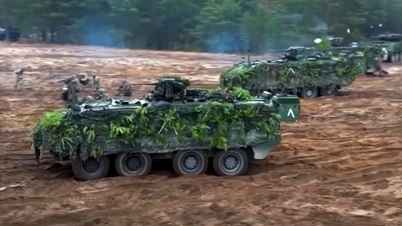


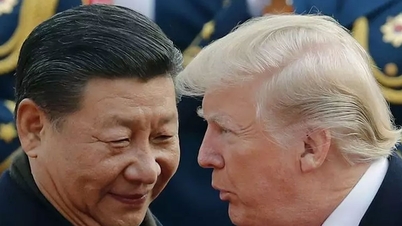

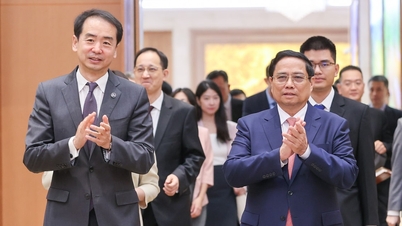

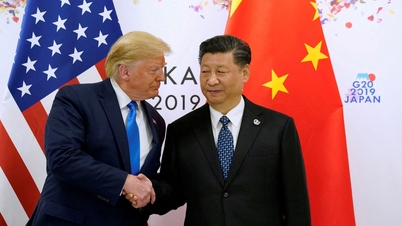

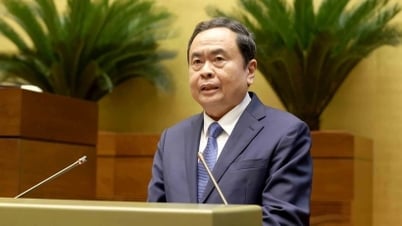

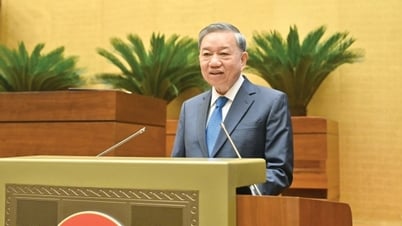
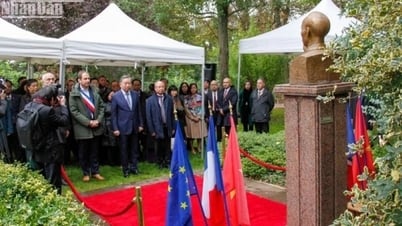
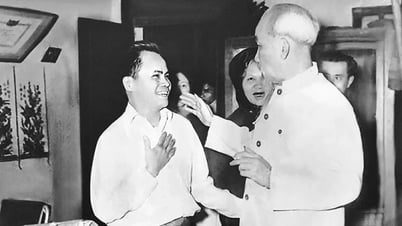

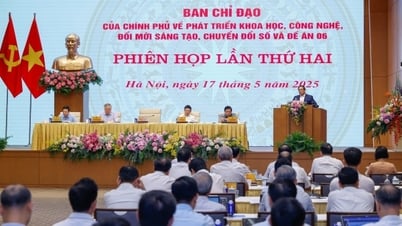




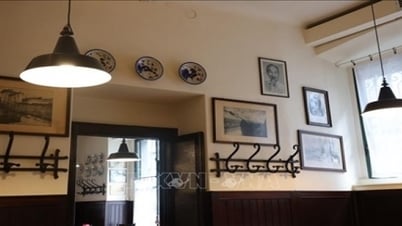



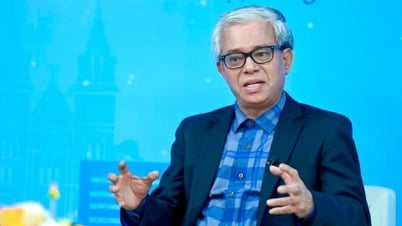
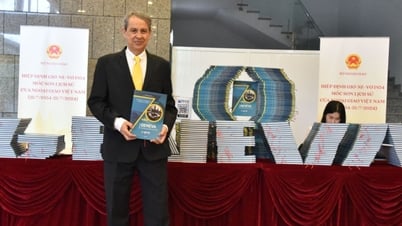













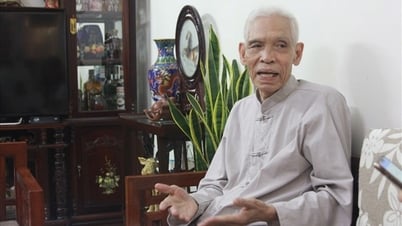







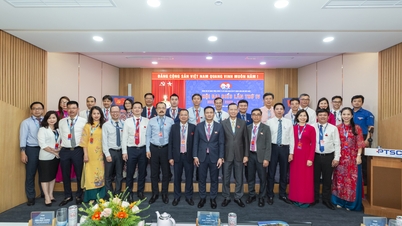






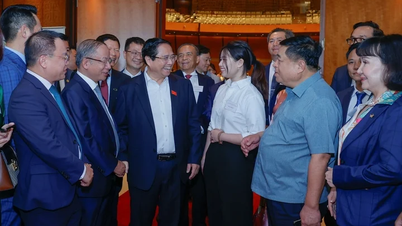


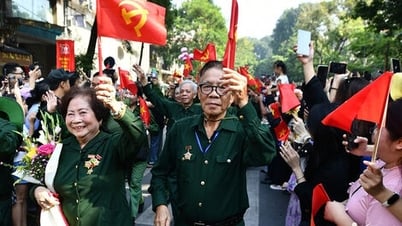
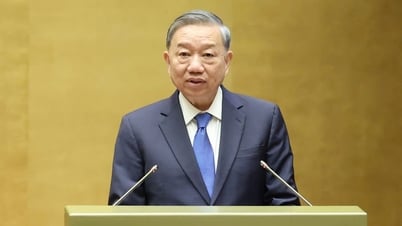









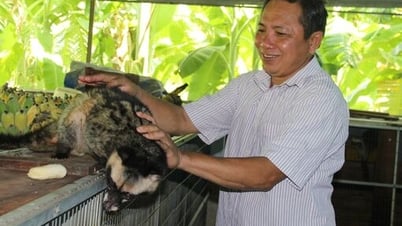

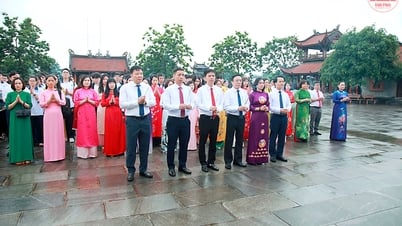



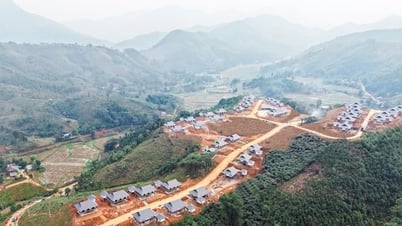

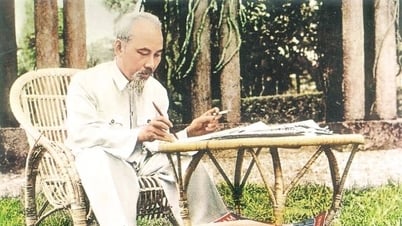










Comment (0)